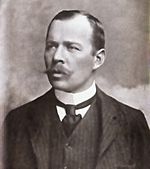Carsten Borchgrevink, Date of Birth, Place of Birth, Date of Death
TweetCarsten Borchgrevink
Anglo-Norwegian explorerAbout Carsten Borchgrevink
- Carsten Egeberg Borchgrevink (1 December 1864 – 21 April 1934) was an Anglo-Norwegian polar explorer and a pioneer of modern Antarctic travel.
- He was the precursor of Sir Robert Falcon Scott, Sir Ernest Shackleton, Roald Amundsen, and others associated with the Heroic Age of Antarctic Exploration.
- From 1898 to 1900, he led the British-financed Southern Cross expedition, which established a new Farthest South record at 78° 50'S. Borchgrevink began his exploring career in 1894, by joining a Norwegian whaling expedition, during which he became one of the first persons to set foot on the Antarctic mainland.
- This achievement helped him to obtain backing for his Southern Cross expedition, which became the first to overwinter on the Antarctic mainland, and the first to visit the Great Ice Barrier since the expedition of Sir James Clark Ross nearly 60 years previously. However, the expedition's successes, including the Farthest South, were received with only moderate interest by the public and by the British geographical establishment, whose attention was by then focused on Scott's upcoming Discovery expedition.
- Some of Borchgrevink's colleagues were critical of his leadership, and his own accounts of the expedition were regarded as journalistic and unreliable. After the Southern Cross expedition, Borchgrevink was one of three scientists sent to the Caribbean in 1902, by the National Geographic Society, to report on the aftermath of the Mount Pelée eruption.
- Thereafter he settled in Kristiania, leading a life mainly away from public attention.
- His pioneering work was subsequently recognised and honoured by several countries, and in 1912, he received a handsome tribute from Roald Amundsen, conqueror of the South Pole. In 1930, the Royal Geographical Society finally acknowledged Borchgrevink's contribution to polar exploration and awarded him its Patron's Medal.
- The Society acknowledged in its citation that justice had not previously been done to the work of the Southern Cross expedition.
Read more at Wikipedia


 Date of Birth:
Date of Birth:  Place of Birth: Christiania, Norway
Place of Birth: Christiania, Norway